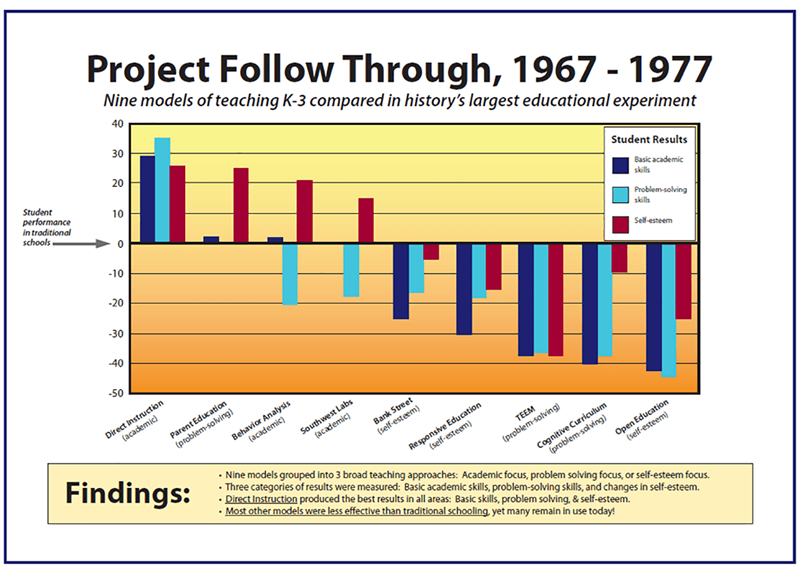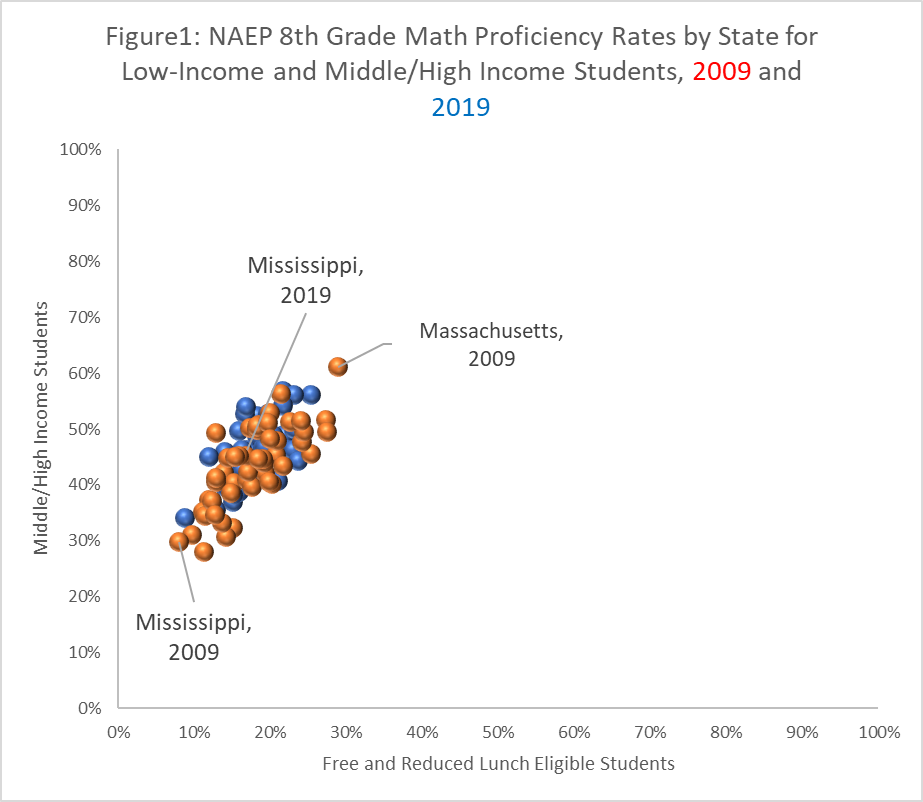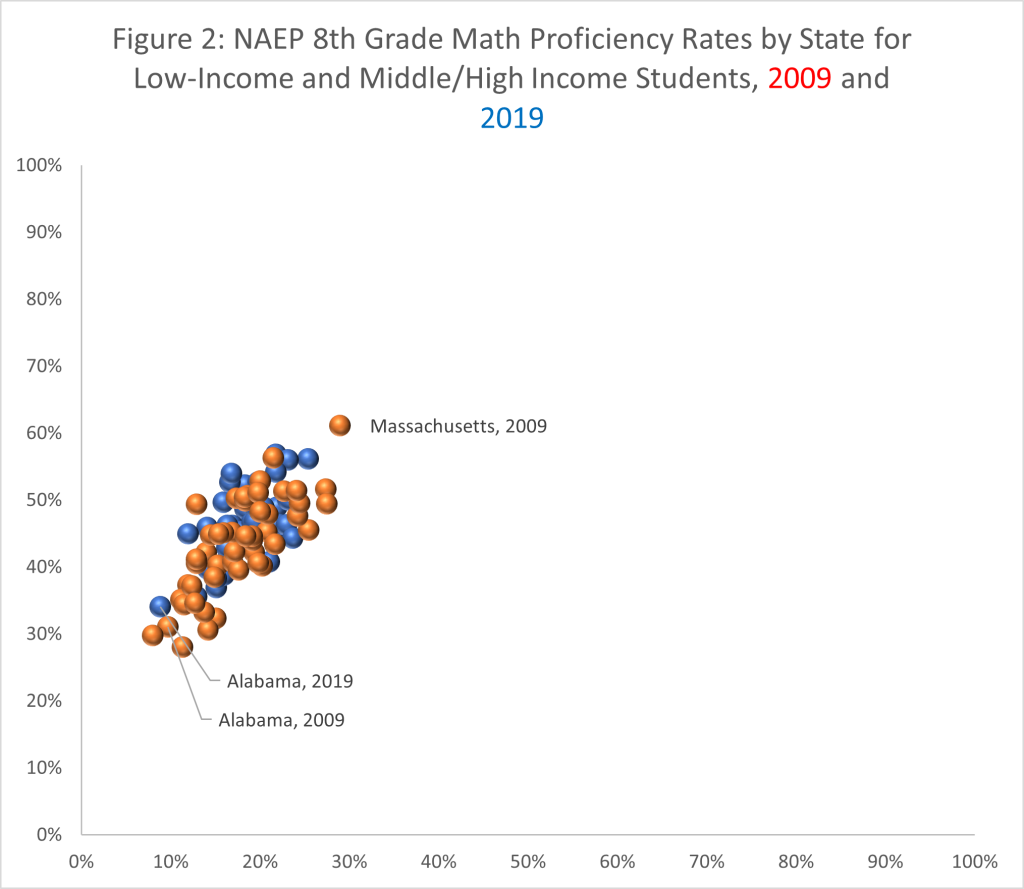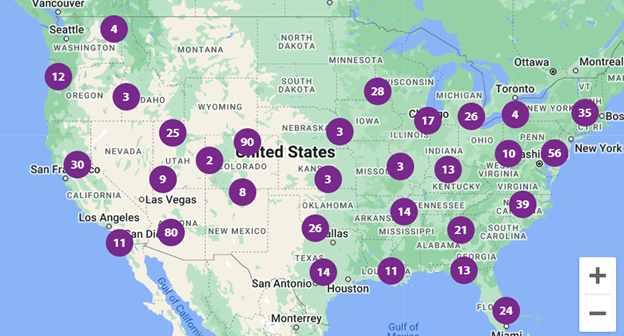
A new working paper by David Grissmer of the University of Virginia and others found very large and positive impacts on reading achievement for students attending charter schools using the Core Knowledge curriculum. The study involved using charter school lotteries for oversubscribed charters utilizing the curriculum, allowing an experimental evaluation with both a control group (lottery losers) and an experimental group (lotter winners). How large is large? “These effects were large enough to close achievement gaps for disadvantaged students by third and sixth grade in all subjects measured.” This is wonderful news, and some careful consideration should be given to how the choice and curriculum improvement movements can aid each other. It has been clear for decades that teaching methods can make a substantial academic difference going back at least to Project Follow Through, which produced results like:

Some of those methods look far more effective than others, so you might think that American educators would strongly gravitate toward the more effective methods, but alas you’d be entirely wrong. Decades ago, John Chubb and Terry Moe taught us that the central problem of American K-12 is politics and those who adhere to failed reading methods, curricula and ineffective teaching methods regrettably outnumber those with opposing preferences.
A more recent example of how a largely curricular reform approach can create positive results comes from Mississippi. Mississippi revamped their public schools’ approach to reading and, well, this happened:

Now before you go off and sneeringly adopt a regression to the mean theory, let’s take a look at neighboring (and demographically similar) Alabama on the same sort of chart:

As you can see in the Alabama chart, there is no guarantee a state will get better just because they start off at the bottom. It is entirely possible to start on the bottom and to stay there. Mississippi adopted only a smidge of parental choice during this period, so we can dispense with all this choice business and get back to the business of top-down reform!

The only reason Grissimer and company were able to study the impact of the knowledge rich curricula in those charter schools in a rigorous fashion was because, well, there are charter schools. If one visits the Core Knowledge Foundation websites and clicks on their national map of Core Knowledge schools, it looks like:

First thing to note: this is a tiny number of schools in total given that there are more than 115,000 schools in America. This map visualizes just how much of a minority religion the Core Knowledge curriculum has been up to this point. Where do more than a smidge of these schools operate? Answer: Arizona and Colorado: two of the #WildWest charter states. Coincidence? Nope: when you click in on both states you find a whole lot of charter and private schools.
A recent New York Times article titled (tellingly)‘Kids Can’t Read’: The Revolt That Is Taking On the Education Establishment details legislative and school board level fights to remove galactically catastrophically ineffective reading curriculum and methods. The story quoted a veteran of the George W. Bush administration:
In 2000, at the behest of Congress, a National Reading Panel recommended many strategies being argued for today. And the Bush administration prioritized phonics. Yet that effort faltered because of politics and bureaucratic snafus.
Dr. (Susan) Neuman, now a professor at New York University, is among those who question whether this moment can be different. “I worry,” she said, “that it’s déjà vu all over again.”
Dr. Neuman is wise to feel concerned. While things seem to be going well currently, they’ve been going well in the past and then just like that the empire strikes back and your left hand goes flying away.

Just so- you can try to order people to do things, but fundamental political dynamics remain unchanged. School districts politically captured by teacher unions and have elaborate levels of job security have proven difficult to change. Meanwhile, schools of choice have been relatively enthusiastic adopters of Core Knowledge and may become more so with more high-quality evidence to drive demand. Choice and curriculum reform are mutually reinforcing and a force to be reckoned with.


